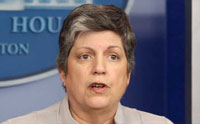redo Jump to...
print Print...

Republicans are criticizing Homeland Security Secretary Janet Napolitano’s new policy to offer a trusted traveler program to Saudi Arabia. (AP Photo)
(by Burgess Everett, Politico.com) – Republican Homeland Security leaders are knocking the Homeland Security Department’s decision to extend a trusted traveler program to Saudi Arabia before countries like the United Kingdom and France.
Homeland Security Secretary Janet Napolitano reached an agreement in January with a top Saudi official to begin work on granting Global Entry status to Saudi Arabian citizens, allowing “pre-approved, low-risk travelers” to pass through customs more quickly in the United States at major U.S. airports.
Napolitano said the meeting with Saudi Interior Minister Prince Mohammed bin Nayef reflected a “commitment to more effectively secure our two countries against evolving threats while facilitating legitimate trade and travel.”
But House Homeland Security Chairman Mike McCaul (R-Texas) and six of his subcommittee leaders wrote in a letter to Napolitano that despite friendly ties between the two nations, the new status presents “potential risks.” They also questioned why Saudi Arabia was selected for Global Entry membership “before other trusted allies.”
“Of the 19 individuals who hijacked American planes on September 11, 2001 – 15 were from the Kingdom of Saudi Arabia,” the Republican lawmakers wrote. “More recently, following the plot to blow up an international flight over Detroit on Christmas Day 2009, the Department saw fit to increase the scrutiny of passengers from countries like Saudi Arabia. This must be a factor in determining who to admit into the Global Entry Program.
“We remain vigilant for vulnerabilities that our enemies can exploit to gain access to the homeland. Expanding Global Entry to high-risk countries may represent such a risk,” they added.
A DHS official said that the initial agreement was struck with the understanding that the U.S. and Saudi Arabia will come together on background checks and red flags that would disqualify participants from the program.
The official stressed that U.S. Customs will gather a multitude of information from Global Entry applicants including “criminal history, customs violations, immigration violations, agriculture violations, investigatory records and terrorist indices.” Applicants also need to conduct in-person interviews with Customs officers and get finger printing done for background checks.
Global Entry is relatively new, having been permanently established in March 2012 after a test run as a pilot program. According to the DHS website, it is open to citizens from the U.S., Canada, Mexico, the Netherlands and South Korea. The U.S. has also reached a deal with Israel on the program.
Reprinted here for educational purposes only. May not be reproduced on other websites without permission from Politico. Visit the website at politico.com.
Questions
1. a) What agreement did Department of Homeland Security Secretary Janet Napolitano make with Saudi Arabia in January? Be specific.
b) Should all travelers from Middle Eastern countries be subject to this same scrutiny? Explain your answer.
2. a) How did Secretary Napolitano explain the agreement with Saudi minister Prince Nayef?
b) What do you think of Secretary Napolitano’s explanation? Explain your answer.
3. a) What concerns/question did House Homeland Security Chairman Mike McCaul and six other committee leaders express in a letter to Secretary Napolitano?
b) What were the Congressmen’s reasons for questioning the advisability of giving Saudi Arabia Global Entry status?
c) Do you think the Congressmen make legitimate points? Why or why not?
4. List the countries the U.S. has given Global Status to thus far.
5. a) Do you support Secretary Napolitano’s decision to give Saudi Arabia Global Entry status, but not give it to British, French, Italian (or any of our very close long-time allies)?
b) If you haven’t already done so, read “Background” below the questions. Do you think the Obama administration should trust the Saudi government? Why or why not?
Background
Trusted Traveler/Global Entry Program:
- Global Entry is a U.S. Customs and Border Protection (CBP) program that allows expedited clearance for pre-approved, low-risk travelers upon arrival in the United States.
- Though intended for frequent international travelers, there is no minimum number of trips necessary to qualify for the program.
- Participants may enter the United States by using automated kiosks located at select airports. (from globalentry.gov)
WAHHABISM:
- Wahhabism is an extremist … and violent movement that emerged, with the pretension of “reforming” Islam, in the central area of Arabia in the 18th century.
- Wahhabism … ([including the] Egyptian Muslim Brotherhood and the Pakistani Islamists) [is] the main source of Islamic extremist violence in the world today.
- Just as there are many denominations of Christianity (such as Catholic or Protestant) or Judaism (such as orthodox or liberal) there are a number of denominations of Islam.
- The major denominations of Islam are Sunni and Shi’a. Wahhabism is a sect of Sunni Islam.
- Wahhabism is the dominent form of Islam practiced in Saudi Arabia, and is spread by the Saudis around the world through the funding of mosques and schools [including in the U.S.]. (from old.nationalreview.com/interrogatory/interrogatory111802.asp)
Daily “Answers” emails are provided for Daily News Articles, Tuesday’s World Events and Friday’s News Quiz.



